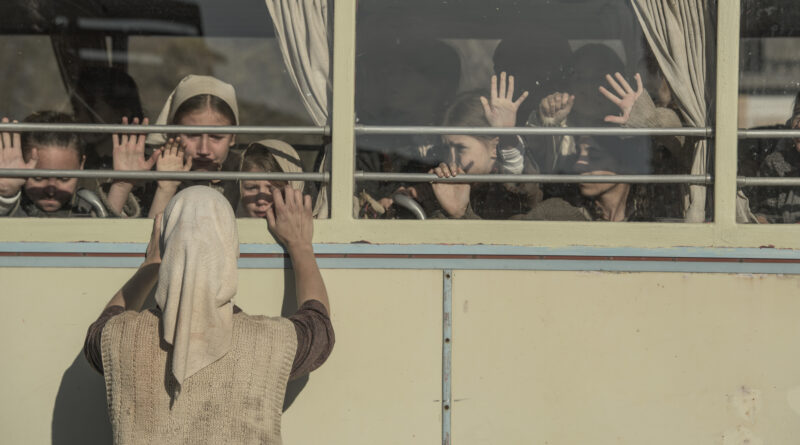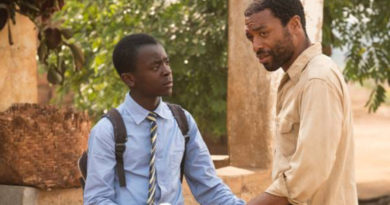Dara of Jasenovac – the untold story of the Holocaust
In 1940s Croatia, 10-year-old Dara (Biljana Čekić) comes face-to-face with the horrors of the Holocaust era after she is sent with her mother and siblings to the concentration camp complex known as Jasenovac.
Overseen by vicious emissaries of the fascist Ustase government, the facility, the only operational death camp during World War II not created or run by the Germans, is tasked with murdering Serbs, Jews and Roma people—and re-educating the few children deemed worthy of rehabilitation.
As unspeakable atrocities unfold all around her, young Dara must summon tremendous courage to protect her infant brother from a terrible fate, to safeguard her own survival and to plot a precarious path toward freedom.
During the course of World War II, the Independent State of Croatia, led by the fascist Ustase government, established a sprawling concentration camp complex known as Jasenovac to exterminate ethnic Serbs, Jews and Roma people in its territory.
Known as Croatia’s Auschwitz, it was the only such operation run by non-Germans in Europe and included camps exclusively for children.
Established in 1941 near the intersection of the Sava and Una Rivers, Jasenovac was one of the 10 largest camps in all of Europe and was known for its brutal, barbaric practices.
Despite the enormous importance it has not only for the region but also for the European and Holocaust history, Jasenovac remains relatively unknown internationally—the site of the camp has since been levelled, leaving no trace of where such monstrous atrocities once took place.
Seeking to shed light on this critical chapter of a nation’s painful past, prolific Serbian filmmaker Predrag Peter Antonijević brings the untold story of the camps to the screen for the first time in the deeply moving drama, Dara of Jasenovac.
Based on heartbreaking first-hand accounts from Holocaust survivors, the film is rooted in the perspective of 10-year-old Dara, a courageous Serbian girl who endures unimaginable tragedy even as she goes to tireless lengths to protect the life of her infant brother.
As a testament to its extraordinary artistry and power, the film was selected as Serbia’s official submission for the Academy Awards®.
Antonijević, known familiarly as “Gaga,” had long weighed the idea of a film about Jasenovac, but he resolved to move forward with the project several years ago after a conversation with his longtime friend, Michael Berenbaum, who signed on as executive producer of Dara of Jasenovac.
A writer, lecturer, and teacher consulting in the conceptual development of museums and the development of historical films, Berenbaum is the director of the Sigi Ziering Institute at the American Jewish University, where he is also a Professor of Jewish Studies.
He previously served as president and Chief Executive Officer of the Survivors of the Shoah Visual History Foundation as well as project director of the United States Holocaust Memorial Museum, overseeing its creation.
“Michael Berenbaum and I agreed that it’s a story that needs to be told because people are not aware of these camps, even though Jasenovac is registered as a death camp with the United States Holocaust Memorial Museum in Washington D.C.,” says Gaga. “We then decided then to take the approach to tell the story about the camps they had exclusively for the kids, which was not the case elsewhere.”
“When we think of the Holocaust, we normally think of Germans and Jews,” Berenbaum adds. “Jasenovac was intriguing because the perpetrators here were Croatians and the primary victims were Serbs. Consequently, the Croatians also got rid of their own Jewish community and did the dirty work that the Germans would have wanted of them. I wanted to make sure that was covered also, that it was understood and clear.”
Antonijević, of course, is no stranger to stories of brutal conflict, having made several films about war over his decades-long career working in both Europe and Hollywood. His 1998 English-language film Savior, produced by Oliver Stone, starred Dennis Quaid as a U.S. mercenary escorting a Serbian woman and her newborn child to a United Nations safe zone during the Bosnian War.
Much more recently, his 2018 drama Zaspanka za vojnike (Soldier’s Lullaby) centered on a World War I veteran who fought for the Serbian army returning to the village where he was once stationed to discover what befell his fellow soldiers.



